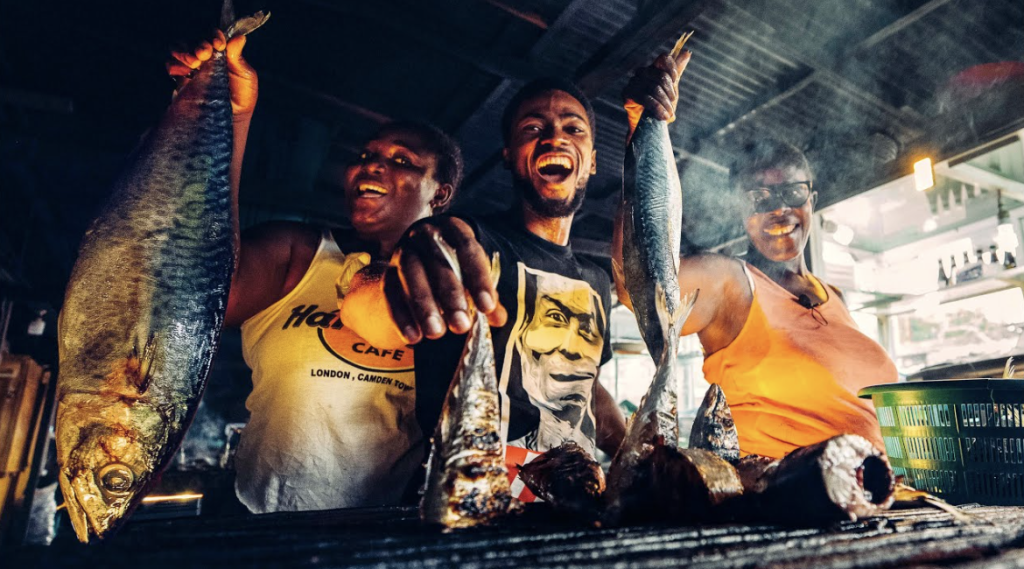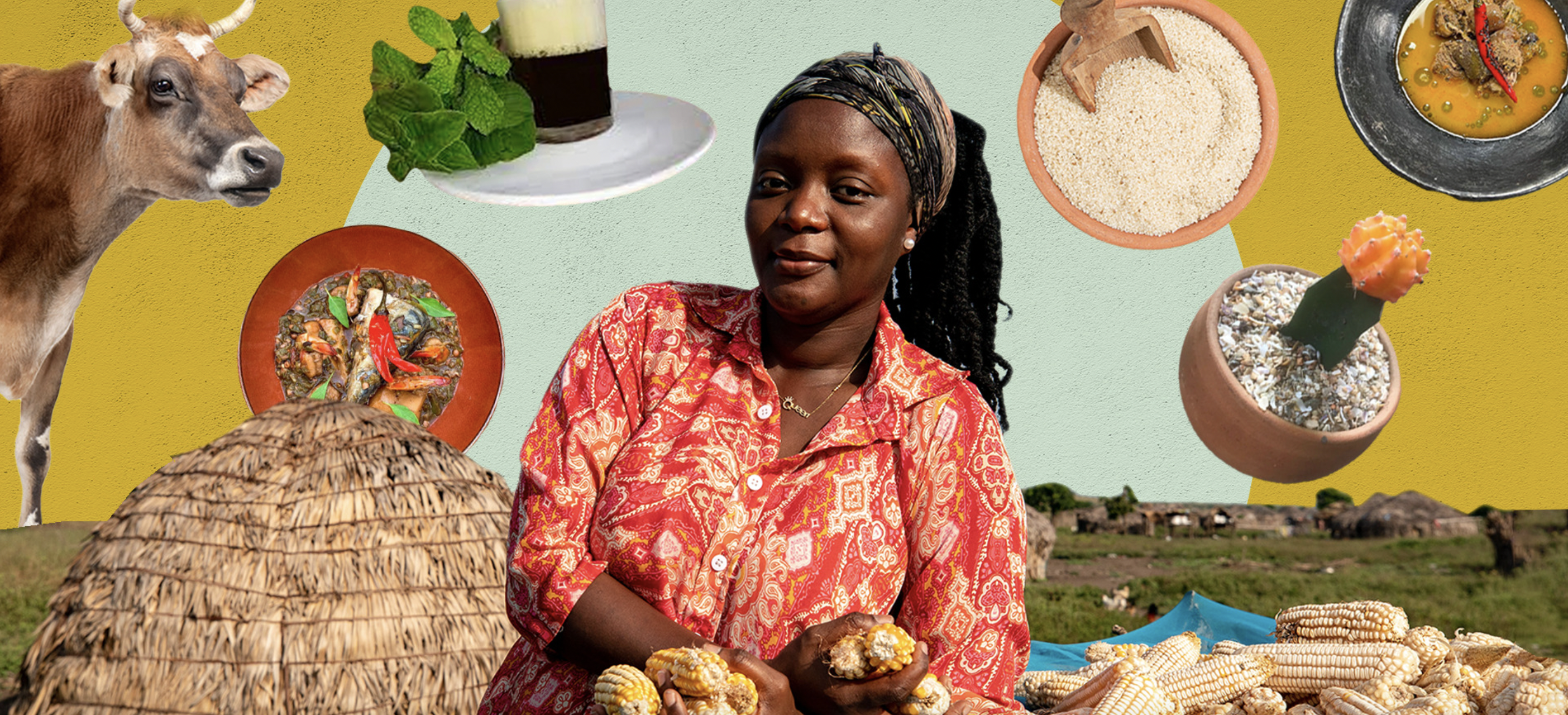Basque Culinary World Prize winner Chef Binta lifts the lid on her heritage
The award-winning chef, who celebrates her Fulani community’s rich culinary heritage at pop-up dining experiences, explains what being part of this nomadic tribe really means, and shares favourite spots and artisans – in her Good City Guide to Accra
(Topia, December 2022) While Fulani chef Fatmata Binta was awarded the Basque Culinary World Prize for exploring West African cuisine’s diaspora through her innovative ‘Dine on a Mat’ experience and setting up the Fulani Kitchen Foundation for women and girls, two questions struck me: who are the Fulani and what does being Fulani mean?
Today’s digital nomads might choose to adopt a pastoral lifestyle, scampering after tax breaks and Airbnb deals, but being on the move is a way of life for the Fulani, also known as the Fula and Fulɓe people. The world’s largest pastoral nomadic tribe, this West African people is restless and brimming with energy, always in motion, packing and unpacking their limited possessions, seeking out highlands to graze their livestock and raise large families in a sustainable and minimalist fashion.
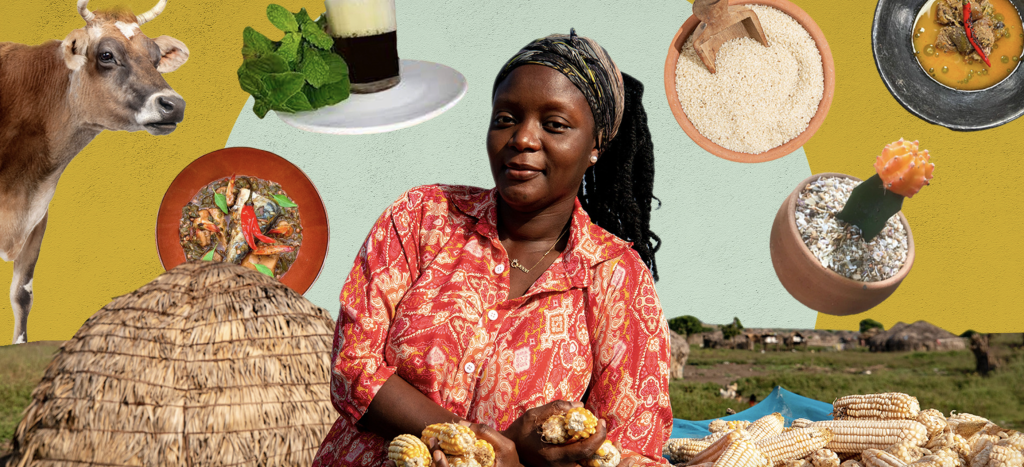
And, by beginning to unravel a little of the nature of Fulani culture and traditions, it becomes easier to understand what propels Chef Binta, making history as the first African to receive the Basque Culinary Center’s prestigious award.
“Being Fulani is a big part of my journey,” she says. “My philosophy stems from family and community, shaped by the culture, making everything from scratch, over and over. As a kid, I hated working so hard for everything, but time in the villages was well spent as I have cousins who [haven’t been and] don’t speak the Fula dialect. So when I visit Fulani communities today, we can communicate and people open up – and I’m truly appreciative of that experience.”
This writer is the eldest of four siblings, what some might consider to be a notable size for a British brood, but the mostly Muslim Fulani raise the large family stakes considerably. Men usually marry four wives and each woman might bear eight children, a family unit that moves together around West Africa, raising offspring and cattle, farming then cooking, living among a wider migratory community. The beauty of being Fulani, says Chef Binta, is that moving doesn’t limit them so they use whatever resources are at hand.
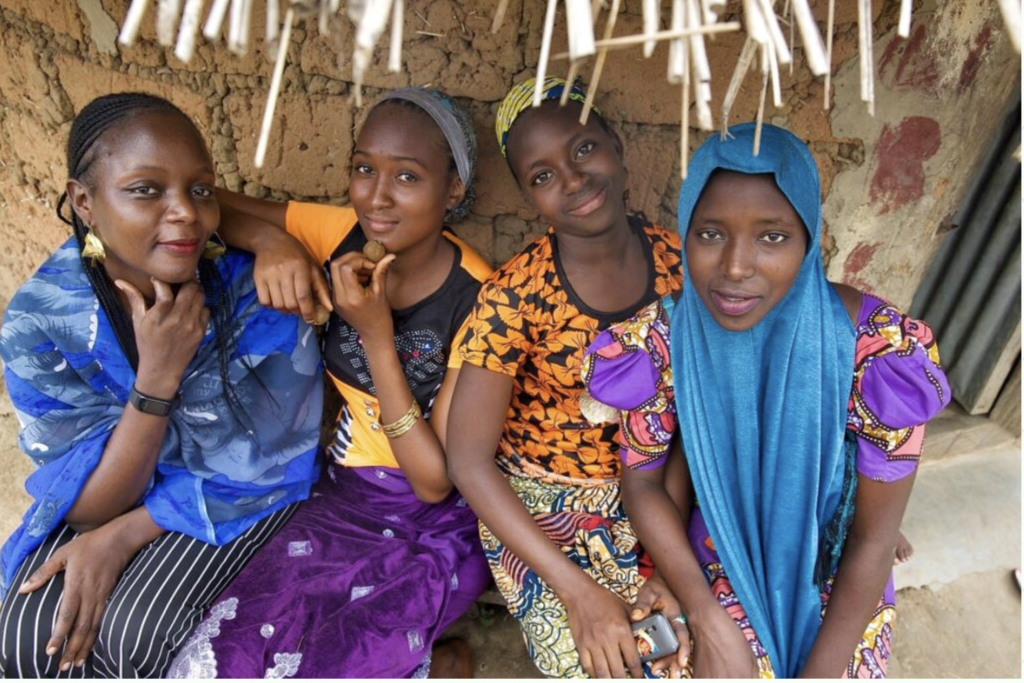
“The generation before me didn’t go to school, in fact people didn’t really believe in education because they were always on the move, and that made it a very family-oriented culture. While my grandparents were Mbororo (nomadic), my parents were tired of that life and moved to Sierra Leone [to settle]. Mum was a true artist who used her skills to take care of us; she’d make soap from scratch and sell it, and she always cooked for us.
“On her side of the family I have over 500 cousins, and there’s another 500 on my dad’s. When it comes to birthdays, we hold secret parties and don’t ever invite anyone! Weddings are crazy too: family travels from every corner, from Senegal and Guinea: everybody comes.”
The Fulani are mostly Muslims and many men are polygynous with three or four wives. Imagine preparing the nuptial banquet for that many guests… where you start from absolute scratch.
“If you want to cook, you first have to fetch firewood, or water from the stream,” she says. “A day starts with men milking the cows then women preparing breakfast, using calabash gourds to pasteurise milk. They have fun with it, and sing special songs that go with the moment. Lyrics might go something like ‘beautiful girl, you’re growing up so well’, praising themselves.”
Then women cook the main meal together, while weaving or plaiting someone’s hair, chatting and gossiping as they prepare. Dishes are pounded for 30 minutes to an hour with a giant pestle and mortar, three or four women working together with one foot on top of the mortar… and you can imagine there’s a lot of gossip if you are one of three or four wives!
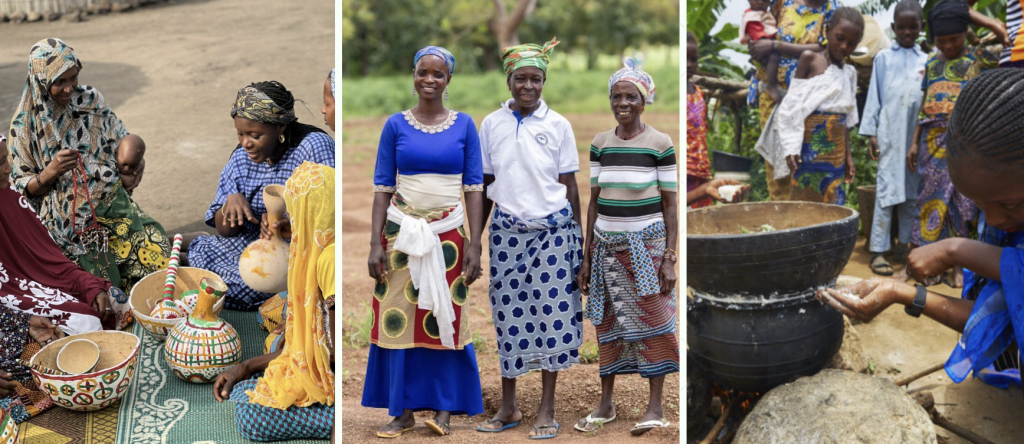
“This traditional and sustainable way of living means we don’t have time to carry things – we’re minimalist – and that hugely influences our cuisine. We grow vegetables and make our own compost by mixing it with cow dung; that’s how we support ourselves. Sustainable and minimal people – that’s our way of life.”
One of Chef Binta’s most vivid childhood food memories is being rewarded for her efforts to learn the Holy Quran as a five year old. “After graduating from that course, your family soaks red or white rice overnight, pounds it, then mixes it with honey to create a sweet treat called chorbal; it’s only prepared for graduation. There was also a candy competition that brought together all the kids aged between five and 12, someone counts, ‘one two three’ and everyone dives on to them. I always looked forward to gathering toffees!”
Another key aspect of Fulani food culture is communal dining experiences, enjoying meals out of one big bowl, and the chef is convinced that food tastes better this way.

“Everyone washes their hands, then sits on a mat or pillows before eating the first dish, a platter. Sitting on the floor is grounding, it creates space for empathy, you look the person next to you in the eye and that’s our social structure. In my culture, you hold the bowl for your elders while they eat, seated upright. You don’t eat the meat in the middle, you wait until it is divided, so as to learn patience and contentment. You don’t just choose. Eating in this way instils values. I created the ‘Dine on a Mat’ concept because that’s how I grew up eating.”
A late bloomer to the gastronomy world – like Leo Espinosa, the Colombian winner of the Basque Culinary World Prize 2017 – Chef Binta enrolled at culinary school aged 29. It paid off: other accolades include winning the Rising Star 2021 prize at The Best Chef Awards. She says: “I’d studied international relations and used to host dinner parties every weekend, and my friends were all about my cooking, such as Jollof rice, a single-pot spicy stew with peppers, that I’d keep for a week!
“I taught English in Madrid for a while then lost my job; it was a challenging time. I wanted to support myself, so I looked up African sandwich recipes on YouTube, and survived selling the sandwiches. I had to return to Sierra Leone for my visa but it wasn’t possible because of the ebola outbreak, so I went to Ghana and decided to try and do what I loved.”
It wasn’t until she became a cook that Chef Binta started spending more time in Fulani communities because, while she knew they all spoke the same language, she wanted to discover whether there were any gastronomic similarities between Sierra Leone and Guinea.
That, combined with the desire to shine a light on ancestral cooking techniques and ingredients such as grains including fonio millet and spices, led her to open a pop-up kitchen initiative in 2018; her nomadic restaurant’s immersive experience has taken place on three continents to date.
Introducing the Fulani foutti Chef Binta shares some Fulani cooking tips with TOPIA readers “We don’t tend to have recipes in Fulani cuisine because women don’t calculate ingredients in these communities: they cook from their hearts and measure with their eyes, and always know when enough has been added. When grilling, we use simple salt from the lake. Essential ingredients for a community are sun-dried okra, African locust bean, sun-dried cayenne pepper, salted fish, ghee butter, shea butter, sun-dried grains and plain yoghurt. A Guinean specialty, foutti is also popular in Mali, Gambia and Senegal. It consists of aubergines, fresh eggs, palm oil or ghee butter, African locust beans, water, toasted and ground sesame seeds, local red rice or fonio, a small grain millet, and okra.
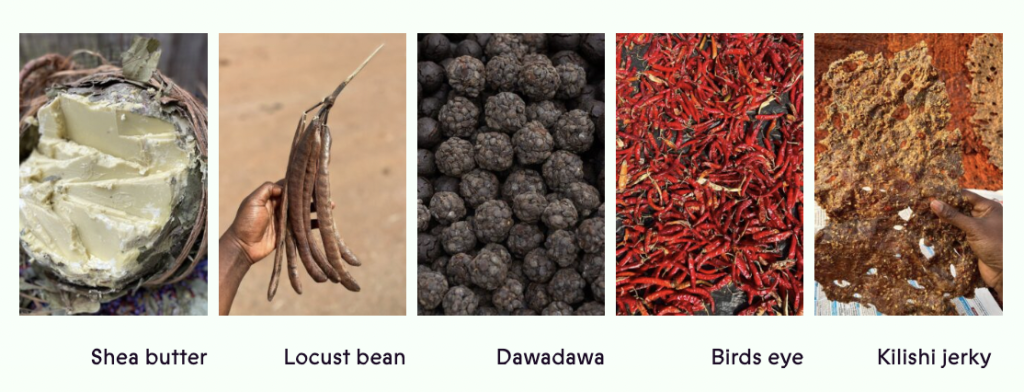
The main prize In recognising the work of chefs with transformative initiatives, the Basque Culinary World Prize – known as the Nobel of gastronomy – can be an engine of change when it comes to supporting initiatives such as the Fulani Kitchen Foundation, helping them come to fruition. US-based French chef Dominique Crenn forms part of the illustrious International Council of the Basque Culinary Center jury chaired by Catalan chef Joan Roca and has been following Chef Binta’s work for a long time. The awarded French chef says: “I’m a fan of a woman who goes out there and does things for their community, to sustain their culture, and Binta does that in a place that people gave little thought to. Plus, she supported herself, on her own. She’s amazing. I am in love with what she’s doing and so very proud of her.” She added that the best leaders in this world are the people that do things without wanting any awards. “They do things because they care about others. Binta is an example of an amazing human.” Being virtually awarded the Basque Culinary World Prize in a Zoom call was undoubtedly a huge moment for the Fulani chef. “I was so emotional, not just because I’m the first African to win but because I realised that dreams can come true, and that the vision of creating a space for women has been recognised. It validates that I’m on the right path and should keep going forward and continue visiting all these communities whose women remind me of my own family. The €100,000 prize money will go towards building a centre that can inspire and educate women,” she says. “Many Fulani women don’t have a voice at home and can’t be entrepreneurs, and even if they can, there are limitations such as ‘you have to be home at a certain time of the day’. Moving from one place to another is historic, it’s culture. My family wanted me to marry at 16, but I said no and escaped this [cycle]. Fulani women need to know that by having skills, being able to read and write, they can do whatever they desire. Because if you create a space for women, they can make decisions for themselves. “Of course, it’s important to protect heritage and know where you are from before you know where you are going. I don’t want to wake up and find that Fulani culture no longer exists. “I’m looking forward to everything unfolding and for the Fulani Kitchen Foundation to start creating a space for these women. And, I also wish my mum was alive to see this happen because she never got to eat at Dine on a Mat.”

Q&A: Fatmata Binta on life in Accra What does Accra mean to you? Accra is home away from home and it has given so much to me, such as the platform to showcase my food and culture to the world. I’ve built something here and while I don’t have family, I do have my friends. It’s an inspiring city as I have been able to connect with people who look, think and eat like me. What’s the vibe? Vibrant, rich in culture and home to many gems – I love Accra! But it’s got a good balance because it’s also a peaceful city. People are polite, the food is interesting and the nightlife is amazing! It’s buzzing, you won’t ever get bored and that’s the reason it’s the West African hub! What neighbourhood do you live in? I live in the Aburi Mountains, as I love the quiet and solitude. After all the travelling, I like to be in the hills with my own company. It’s cool and misty between 5am and 7am, which is amazing. It’s mostly forest with a few homes, but it’s slowly developing. It’s about a 50-minute drive into Accra, 35 in light traffic. What’s the music and arts scene like? Afrobeats are dominating right now, plus there’s a lot of art and fashion. You can check out contemporary local artists’ works at Gallery SoView; its founder Barbara Kokpavo is responsible for a lot of collaborations. There’s also always something going on at the Nubuke Foundation, which showcases arts and crafts made by local artists. Agriculture cultivation is fundamental to the Fulani; what do you grow? I cultivate tomatoes and aubergines in my garden, there are also fruit trees such as lemon, lime, orange and mango, plus there’s a lot of avocado. I can’t eat it all so I drop food off to my friends. They always laugh and say: ‘delivery is coming!’. How do you continue food exploration living in Accra? Once a month I travel outside the city and visit the Fulani communities as they are the keepers of our authentic recipes. I start by milking the cows, then make all the dishes with the women, taking notes as I go, then create Dine on a Mat dinners inspired by them. How have you incorporated the Atlantic ocean into your life? I love going to the Osu Night Market to eat kenkey, which is fermented corn and cassava dough wrapped in a fermented corn leaf with shito – a smoked fish and vegetable hot sauce – and fried anchovies or shrimp. It’s very good! Given a bottomless budget, how would you improve Accra? I’d like to see consistency in restaurants, in terms of the quality of the food. They start out well then the next time I go, it’s totally different. And, traffic is becoming a problem.
